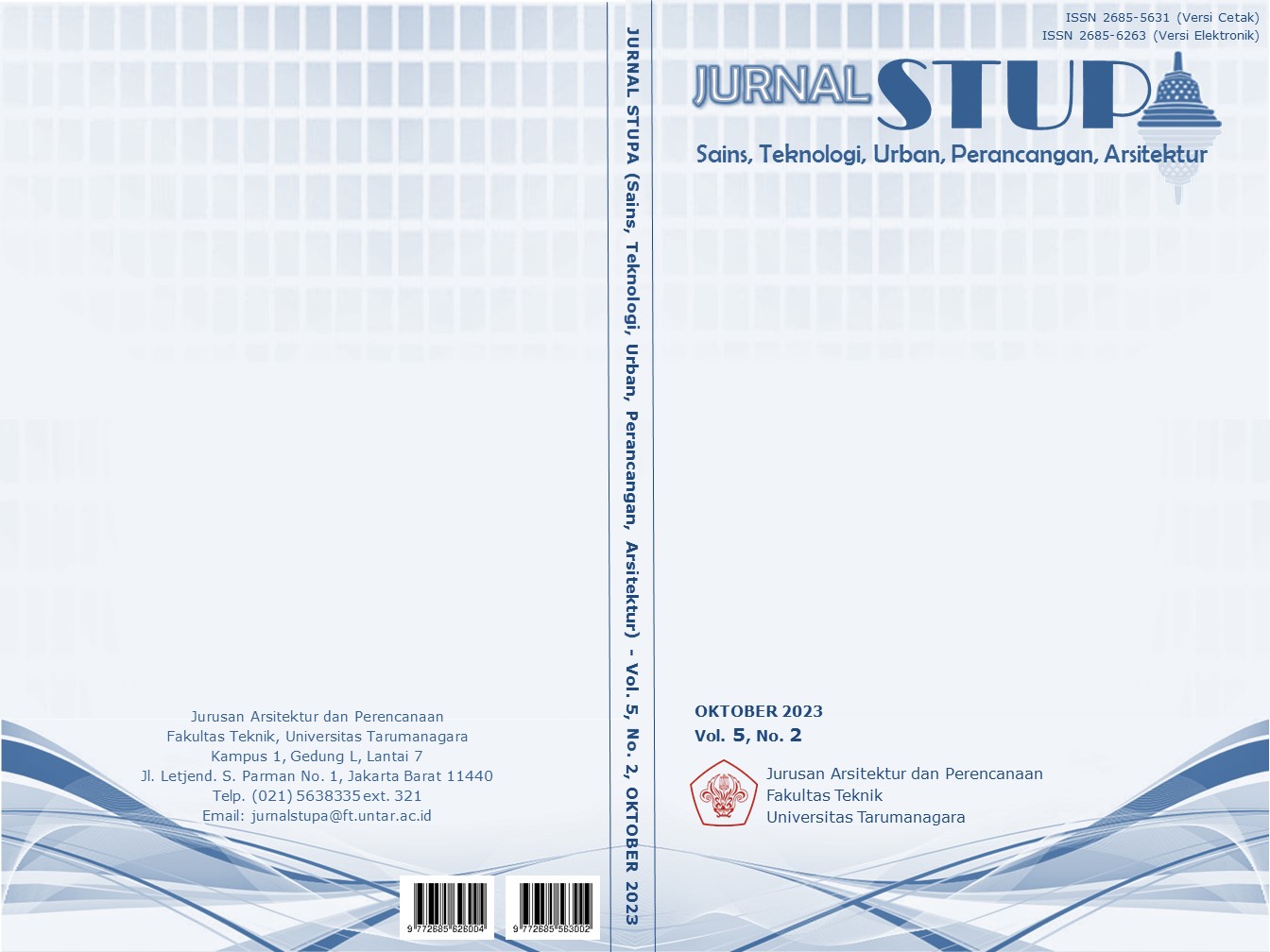STRATEGI PENGGUNAAN KEMBALI ADAPTIF PADA PUSAT KOMPUTER DAN PRINTER ORION DUSIT MANGGA DUA
Main Article Content
Abstract
The economic crisis, digitalization, and the pandemic have had a profound impact on the computer and printer retail trade sector with physical stores in Orion Dusit, Mangga Dua. Empathizing with Gen-X traders in this sector who have failed to adapt in the world of commerce due to the crisis or digitalization of the e-commerce market, this project proposes potential architectural solutions centered on sustainable and community-based concepts to revitalize and revive the sector. This research aims to serve as a foundation for a commercial architecture project that can create a tangible community in the computer and printer trading sector that can encourage a sense of ownership, and offer economic stability. This study uses qualitative research methods to renew and improve existing building conditions that have the potential for architectural intervention using adaptive reuse strategies. With a holistic programming strategy that combines user needs from the past, present, and future, the new Orion Dusit will be envisioned to accommodate continuously changing retailer needs, provide alternative business solutions, and grow linearly with the future market.
Keywords: adaptive reuse; commercial; empathy; Gen-X; tangible community
Abstrak
Krisis ekonomi, digitalisasi, dan pandemi sangat berdampak pada sektor perdagangan eceran komputer dan printer yang memiliki toko fisik di Orion Dusit, Mangga Dua. Berempati terhadap pedagang Gen-X di sektor ini yang gagal beradaptasi di dunia perdagangan akibat krisis maupun digitalisasi pasar e-commerce, proyek ini mengusulkan potensi solusi arsitektur yang berpusat kepada konsep berkelanjutan dan berbasis masyarakat untuk merevitalisasi dan menghidupkan kembali sektor tersebut. Penelitian ini bertujuan sebagai landasan untuk proyek arsitektur komersial yang dapat menciptakan komunitas nyata (tangible) dalam sektor perdagangan komputer dan printer yang dapat mendorong rasa kepemilikan (ownership), dan menawarkan stabilitas (stability) ekonomi. Penelitian ini menggunakan metode penelitian kualitatif untuk memperbarui dan memperbaiki kondisi bangunan eksisting yang berpotensi diintervensi secara arsitektur menggunakan strategi penggunaan kembali adaptif. Pemrograman baru yang diterapkan pada rancangan bersifat holistik yang menggabungkan kebutuhan pengguna pada masa lalu(past), sekarang(present), dan masa depan (future), dengan visi akhir Orion Dusit yang dapat mewadahi perubahan kebutuhan pedagang, memberikan solusi alternatif usaha dan bertumbuh secara linear dengan potensi pasar di masa depan.
Article Details
Section

This work is licensed under a Creative Commons Attribution-NonCommercial-ShareAlike 4.0 International License.
This work is licensed under a Jurnal Sains, Teknologi, Urban, Perancangan, Arsitektur/ STUPA Creative Commons Attribution-NonCommercial-ShareAlike 4.0 International LicenseReferences
Aytac, D. O., Arslan, T. V., & Durak, S. (2016). Adaptive reuse as a strategy toward urban resilience. European Journal of Sustainable Development, 5(4), 523-523.
Bullen, P., & Love, P. (2011). A new future for the past: a model for adaptive reuse decision‐making. Built environment project and asset management, 1(1), 32-44.
Bruneau, E. G., Cikara, M., & Saxe, R. (2017). Parochial empathy predicts reduced altruism and the endorsement of passive harm. Social Psychological and Personality Science, 8(8), 934-942.
Havik, K., & Sioli, A. (2021). Stories for Architectural Imagination. Journal of Architectural Education, 75(2), 160-169.
Mohamed, R., Boyle, R., Yang, A. Y., & Tangari, J. (2017). Adaptive reuse: a review and analysis of its relationship to the 3 Es of sustainability. Facilities, 35(3/4), 138-154.
Pallasmaa, J., Mallgrave, H. F., Robinson, S., & Gallese, V. (2015). Architecture and empathy. Finland: Tapio Wirkkala Rut Bryk Foundation.
Rahman, F. (2022) Sampah Elektronik Dan Hak untuk Memperbaiki (right to repair), Pusat Studi Lingkungan Hidup UGM. Retrieved, May 5, 2023, from https://pslh.ugm.ac.id/sampah-elektronik-dan-hak-untuk-memperbaiki-right-to-repair/.
Sutopo, H. E. (2011). Perencanaan Dan Perancangan Arsitektur (Ppa) Sragen Computer Centre. Surakarta: Disertasi S3, Universitas Muhammadiyah Surakarta.
Republik Indonesia. (1998). Keputusan Menteri Perindustrian Dan Perdagangan Republik Indonesia Nomor: 23/MPP/Kep/1/1998 Tentang Lembaga-Lembaga Usaha Perdagangan
Republik Indonesia. (2020). Peraturan Pemerintah nomor 27 Tahun 2020 tentang Pengelolaan Sampah Spesifik.

